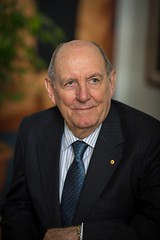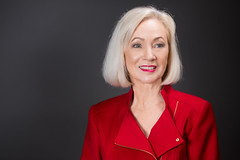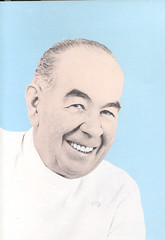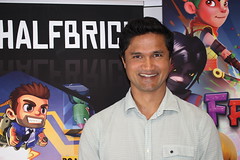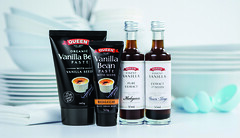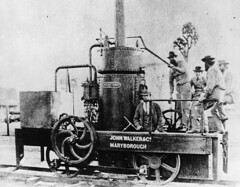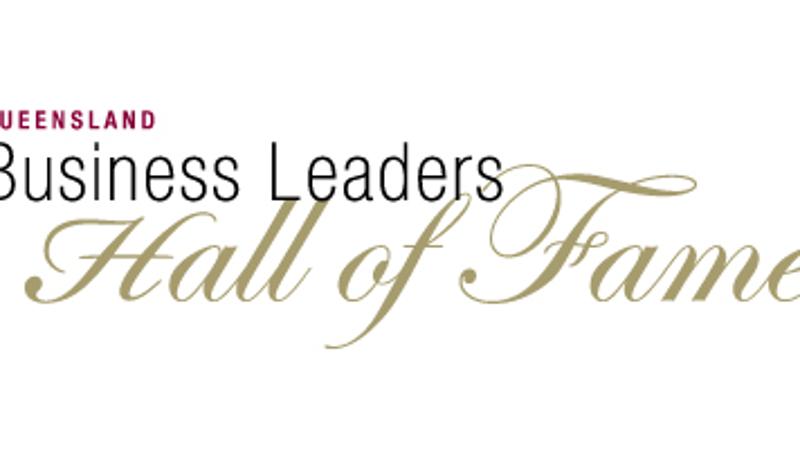
Six Queensland business luminaries making their mark in diverse fields from health to engineering and gaming were inducted on Thursday July 20 at a gala evening event into the Queensland Business Leaders Hall of Fame.
The Queensland Business Leaders Hall of Fame, now in its ninth year, is a joint initiative between the QUT Business School, State Library of Queensland and Queensland Library Foundation.
The Hall of Fame space resides within State Library of Queensland, and a digital story collection is available online at leaders.slq.qld.gov.au.
Please click on the 2017 inductees’ names to go to their digital stories. High-res images are also available through the ‘Images’ links:
George Chapman AO, a fourth generation North Queenslander, has been a business and tourism pioneer in the region for more than three decades. Among his significant achievements is development of the internationally awarded, eco-friendly Skyrail Rainforest Cableway between Kuranda and Cairns, opened in 1995.
Chairman of the Chapman family group of companies with interests in property development, transport, tourism, retail, aquaculture, biotechnology and media, George began his career as a surveyor.
His contributions to business and the community include as past chairman of Telecasters North Queensland, Ten Network Holdings, TAB Queensland and the Cairns Port Authority, as a substantial founding shareholder in the Tjapukai Aboriginal Cultural Park, founder of the Cairns Regional Development Bureau, chairman of the Far North Queensland Youth Assistance Fund, member of the Board of Trustees of the Cancer Council Queensland, and founding member and board member of the Great Barrier Reef Foundation.
He was appointed an Officer in the General Division of the Order of Australia (AO) in 2002. Images
Dr Dimity Dornan AO is recognised nationally and internationally for changing the lives of thousands of hearing-impaired children and young adults through training the brain to use cochlear implants and other technologies.
A speech pathologist, she founded not-for-profit organisation Hear and Say in Brisbane in 1992, serving as its Clinical Director and now as Executive Director. Hear and Say provides hearing services for thousands of children annually in Queensland and Australia, and its global arm Hear and Say WorldWide provides professional training in more than 40 countries.
A leader in paediatric hearing impairment research and part of the HEARing Cooperative Research Centre, she has founded a number of national and global research collaborations and initiatives, including the global group Human-Bionics Interface Frontiers. She has served on a number of international boards, including the Alexander Graham Bell Academy Board (formerly Auditory Verbal International).
She was appointed an Officer in the General Division of the Order of Australia (AO) in 2014. Images
From simple beginnings in a health food store in Brisbane’s CBD in the 1930s, Blackmores has grown into an international business, with more than 1000 employees in Australia, New Zealand and Asia and its range of vitamins, minerals, herbal and nutritional supplements sold to consumers in 17 countries.
The company was founded by English immigrant and naturopath Maurice Blackmore (1906-1977, pictured), whose views on natural health and preventive medicine were at the time considered ‘radical’.
His son Marcus, Blackmores’ Chairman, took the company reins in 1975 and has built on his father’s legacy. He said the company, now headquartered in Sydney, remains proud of its Queensland heritage. For nine consecutive years Blackmores has been named the Reader’s Digest Most Trusted Brand in the Vitamins and Supplements category. Images
Founded in Brisbane in 2001 by Shainiel Deo (pictured) and a group of young graduates with a passion for games, Halfbrick has grown to be a leader in the games development industry in Australia and make its mark in the $108 billion global games industry.
After initially developing licensed content for major publishers, Halfbrick cemented its name with the release in 2010 of its own Fruit Ninja, one of the first mobile games to take advantage of the iPhone. Fruit Ninja has achieved more than 1.5 billion downloads and is the world’s second most downloaded app of all time.
The studio followed that success with a number of other games, including Jetpack Joyride, which is among the top 25 downloaded games in the world with more than 500 million downloads.
Halfbrick’s achievements have seen it grow to employing 110 people in Brisbane, Sydney, Adelaide, San Francisco, Madrid and Bulgaria.
Chief executive Shainiel Deo is the only founder who remains with Halfbrick. Images
An iconic name synonymous with vanilla, Queen is the state’s longest-selling food brand celebrating its 120th anniversary this year.
The Australian market-leading producer of vanilla essences, extracts, food colourings and other cooking and baking staples sells millions of bottles of its products throughout the country and overseas. In Australia alone, its production output could make more than 50 million cakes and desserts in a year.
The Queen brand traces its origins to Londoner Edward Taylor, who migrated to Queensland and formed a partnership with J.L. Colledge to become Taylor and Colledge. The Himstedt family acquired the company in 1978, with father Ross later joined by sons Fred, Sam and Tom in the business.
Among Queen’s innovations has been the creation of a vanilla bean paste, the first of its kind on Australian supermarket shelves, which won the Most Innovative Food Ingredient award at the 2005 International Food & Drink Event in the UK.
Queen has also assisted vanilla growers in Vava’u, Tonga to re-establish their once-thriving vanilla industry and grow world-class vanilla. Images
For more than a century, from 1867, Maryborough-based Walkers Limited was an industry stalwart in regional Queensland and engineering powerhouse. Its success was crucial to Maryborough’s development as a city and as a community.
Originally formed to supply equipment to gold mining operations around Gympie, the company quickly expanded to service the sugar industry, manufacturing many of the sugar mills around Maryborough, Proserpine and Mackay. Walkers then branched into shipbuilding and constructing locomotives. Its foundry shipyard was one of the nation’s leading builders of naval ships, barges and dredges, building 68 ships between 1877 and 1974, when the shipyard closed.
Walkers also built the state’s first steam engine locomotive, the ‘Mary Ann’ (pictured), which had a test run in 1873 and operated on a timber-built tramway. The company subsequently won a contract in 1876 to build 30 B15-class locomotives for then Queensland Railways, and went on to build diesel and electric locomotives, including high-speed Tilt Trains.
The company enjoyed a strong history of leadership, from its founders John Walker, James Wood, Thomas Braddock Snr, and W.T. Sandry, through to Dr Walter Hughes CBE (1917-1999). Dr Hughes, a leading shipbuilder at BHP, joined Walkers in 1954, became chairman in 1978, then served on the board when Walkers merged with Evans Deakin Industries in 1980. He retired the following year.
In 2001, Walkers/Evans Deakin Industries became part of the Downer Group. Images
Media contact:
Karen Milliner, QUT Media, 07 3138 1841 or k.milliner@qut.edu.au
After hours, Rose Trapnell, 0407 585 901 or media@qut.edu.au
